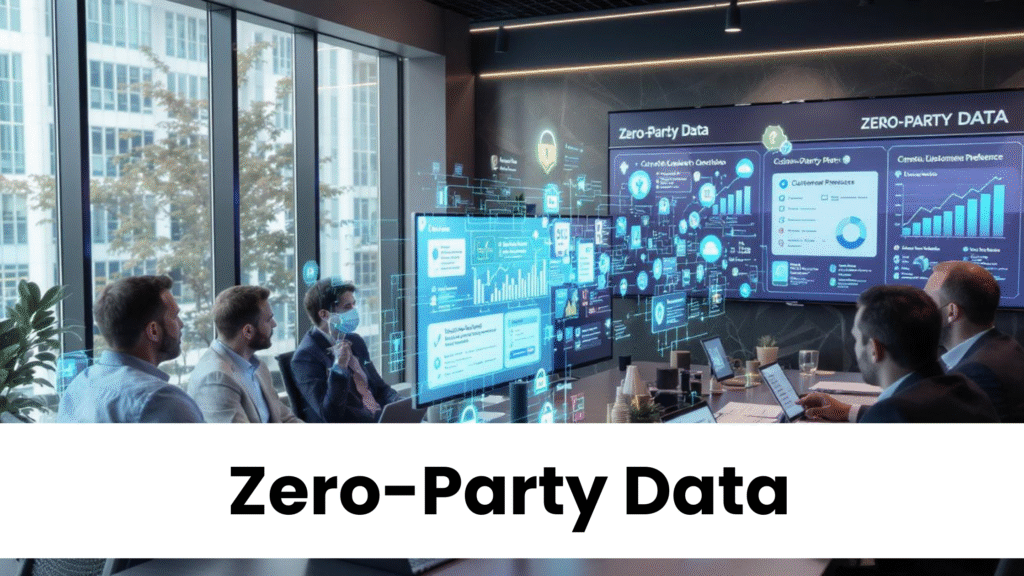In today’s privacy-conscious business environment, companies are seeking ways to collect accurate and consented customer information while maintaining compliance. One of the most effective solutions is Zero-Party Data. This type of data is voluntarily shared by customers, making it inherently transparent, trustworthy, and legally compliant. Unlike third-party data, Zero-Party Data eliminates uncertainty about accuracy and regulatory risk, allowing marketers to engage prospects confidently.

The Compliance Advantage of Zero-Party Data
B2B organizations are under increasing pressure to meet global privacy regulations. Zero-Party Data offers a unique advantage because it is permission-based, meaning marketers receive data directly from customers who understand how their information will be used. This approach simplifies compliance with regulations such as GDPR, CCPA, and other regional privacy laws, reducing the risk of fines or reputational damage.
Building Customer Trust Through Transparency
Trust is a crucial factor in B2B relationships. When businesses openly request and use customer information through Zero-Party Data practices, they demonstrate respect for privacy and data ethics. Customers are more likely to engage and share valuable insights when they feel their information is handled responsibly. Transparent communication about data usage also strengthens brand credibility and fosters long-term loyalty.
Collecting Zero-Party Data Effectively
To maximize the value of Zero-Party Data, marketers should implement interactive methods for data collection. Tools such as surveys, quizzes, preference centers, and customized registration forms encourage customers to share information willingly. Providing clear benefits in exchange for this data, like personalized recommendations, exclusive content, or early access to products, ensures the exchange feels valuable and ethical.
Enhancing Marketing Personalization
Zero-Party Data allows B2B marketers to craft highly targeted campaigns that address specific preferences and needs. By understanding exactly what customers want, businesses can deliver personalized emails, offers, and product recommendations that resonate with decision-makers. Personalization increases engagement rates, strengthens relationships, and drives measurable business outcomes.
Strengthening Account-Based Marketing Initiatives
Account-based marketing benefits significantly from Zero-Party Data. By collecting insights directly from stakeholders in target accounts, marketers can segment audiences more accurately and create tailored outreach strategies. This precision reduces wasted effort and improves conversion rates, ensuring that marketing resources are used effectively and campaigns achieve higher ROI.
Predictive Insights and Strategic Planning
Zero-Party Data is a powerful tool for predictive analytics. By analyzing voluntarily shared customer preferences and intentions, B2B companies can anticipate future needs, identify upselling opportunities, and optimize product or service offerings. Integrating this data with CRM and analytics platforms provides a comprehensive view of accounts, enabling more informed strategic decisions.
Reducing Reliance on External Data Sources
With the phasing out of third-party cookies and increasing restrictions on external data providers, Zero-Party Data ensures marketing campaigns remain sustainable. Consent-driven data allows businesses to continue precise targeting without relying on unverified sources, protecting both compliance and marketing effectiveness. This approach is essential for organizations operating across multiple regulatory regions.
Creating a Holistic Zero-Party Data Strategy
A successful Zero-Party Data strategy requires seamless integration of collection, analysis, and activation. Marketing automation tools and AI-driven platforms can help segment audiences, deliver personalized content, and track engagement in real time. By adopting a holistic approach, businesses can optimize marketing spend while creating meaningful experiences that build trust and loyalty.
Educating Teams and Clients on Data Ethics
Educating internal teams and B2B clients about the value of Zero-Party Data is critical. Many decision-makers may view data collection as intrusive, so clear explanations of how the data is used and protected can alleviate concerns. Demonstrating the benefits of tailored experiences and improved service helps reinforce the perception of Zero-Party Data as a tool for value creation rather than exploitation.
Integrating Zero-Party Data Across Systems
To unlock the full potential of Zero-Party Data, businesses should integrate consented information across CRM, marketing automation, and analytics platforms. This unified approach enables accurate segmentation, timely communications, and actionable insights that improve campaign performance. Integration also allows organizations to maintain a consistent, privacy-compliant approach to data management.
Preparing for a Privacy-First Future
Zero-Party Data represents the future of B2B marketing where trust, transparency, and compliance are central. By prioritizing consent and customer preferences, businesses can strengthen relationships, maintain regulatory compliance, and deliver personalized experiences that resonate with their audience. Organizations adopting this approach will be well-positioned for long-term success in a rapidly evolving digital landscape.
Read Full Article : https://acceligize.com/featured-blogs/zero-party-data-in-b2b-marketing-building-trust-compliance/
About Us : Acceligize is a global B2B demand generation and technology marketing company helping brands connect with qualified audiences through data-driven strategies. Founded in 2016, it delivers end-to-end lead generation, content syndication, and account-based marketing solutions powered by technology, creativity, and compliance.

